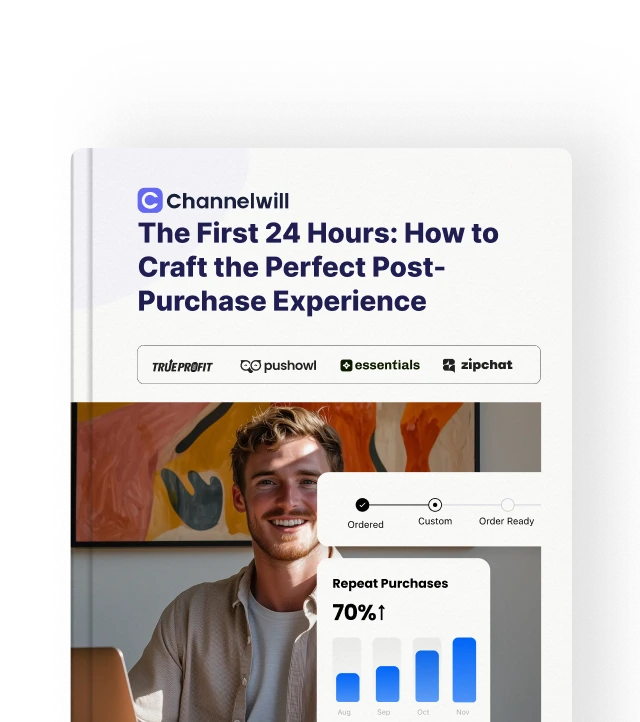The most successful businesses know that the value of a customer does not end after payment for a product or service. The same applies to eCommerce stores, as brands that can cultivate trust and loyalty in their customers see higher returns in revenue. These brands achieve their success by investing heavily in a practice called customer commitment.
What is Customer Commitment?
Customer Commitment is the ability of brands to keep people loyal to their products or services by delivering value. You can think of it as the processes or actions a business uses to build strong relationships with its customers. These activities can range from loyalty programs to customer support services. All in all, the customer experience must be kept in mind, from customer acquisition to post-purchase service.
While there are many strategies, the most important commitment strategy an eCommerce store can implement is delivering on promises of quality, quantity, and delivery times. These promises will form the basis of your customer’s impression of your brand. With core promises delivered, the implementation of other strategies like subscription, referral, and loyalty programs is much easier. Remember, a brand’s commitment to customers is based on the understanding that retaining existing customers is easier than acquiring new ones.
To build loyalty and retain customers, an eCommerce store must invest in tools that improve the customer’s shopping experience, engagement, and post-purchase experience. For example, Translate is a great app that allows customers to shop and pay in their local language and currency, respectively.
Importance of Customer Commitment
Fostering brand commitment in customers by delivering on promises builds better and stronger brand-customer relationships. Customers who are satisfied and engaged with a brand tend to spend more on the products and services offered. And with a repeat buyer in your corner, you can count on having long-term increased sales.
Continuous implementation of customer and service commitment strategies can turn repeat buyers into loyal customers. While repeat buyers improve revenue, loyal customers can help your business realize its growth potential. Brand loyalty encourages customers to share their shopping experience with family and friends, thus bringing in more customers. Additionally, customers recommended by people they trust tend to have a higher chance of becoming repeat buyers and loyal customers.
Though commitment might result in increased sales, the type of commitment customers have towards your brand may vary. These types of commitments are based on the strategies implemented and the stage of commitment the customer is currently at.
Three Types of Customer Commitment
The types of commitment discussed in this article are based on John Meyer’s and Natalie Allen’s Three Component Model of Commitment. And though their study focused on employee commitment, it can be used to teach us a lot about customer commitment.
1. Affective Commitment
The affective commitment definition is closely associated with the positive commitment a customer has to a brand. Since this commitment type is based on positive emotions that customers associate with a brand, it inspires a high level of dedication and trust in a brand. Through this type of commitment, brands can enjoy reduced marketing costs due to customer advocacy.
Customers who have an affective commitment towards a brand are emotionally invested in the business and the products and services they produce. Once these customers become brand advocates, they can go above and beyond to recommend products and services to friends and family. Since the customer-brand relationship stage associated with loyal advocates is commitment, brands with customers in this commitment stage can greatly benefit from positive word-of-mouth marketing.
So, how do you create affective commitment?
Affective commitment goes beyond customer satisfaction. To foster this commitment, brands need to move past customer satisfaction to customer delight. You can delight your customers by adding more personalization to their shopping experience and giving them stellar customer support. However, the most surefire way to foster affective commitment is by offering amazing rewards and loyalty programs. To do this, you can take advantage of reward and loyalty program apps like Trustoo Loyalty on Shopify.

Easy to customize your brand loyalty program
Many popular business brands leverage reward programs to foster affective commitment. For example, Starbucks has ‘My Starbucks Rewards’, and Sephora has its ‘VIB Program.
Other great examples of affective commitments include Apple and Ferrari. For these two brands, despite being more highly priced than their competitors, customers are willing to wait in line to get their latest releases.
2. Continuance Commitment
Unlike previous commitments, a continuance commitment is not born out of the willingness to stay with a brand. The customer with continuance commitment feels like they should remain with a business. Although the line between this and the previously mentioned commitment type can be blurry, you will find that the latter usually occurs when customers are not too impressed with a brand. The brand in question here does deliver what it promises, but no ‘buzz’ effect builds an emotional connection.
Customers who are committed this way rarely advocate for a brand’s products, even though the commitment may last for a while. In this commitment type, brands can only enjoy repeat purchases and brand loyalty from the customer, not brand recommendations and referrals. And since the brand-customer relationship in this case is based on logic instead of emotion, the customer may shift to other brands with better prices and value.
Now, although continuance commitment may not be better than affective, it does result in higher sales and increased revenue. Therefore, learning how to create continuance commitment is still important for growing businesses.
So, how do you create a continuance commitment?
The best way to create continuance commitment is by providing customer satisfaction. Competitive pricing, top-notch features, and generic incentives like discounts are some of the tactics a business can use to foster this commitment. Brands aiming for this type of commitment only have to meet the customer’s needs and expectations, since exceeding them will create an effective commitment.
Examples of continuous commitment include Microsoft, Walmart, and IKEA. These are brands that offer consistency and reliability to their customers and rarely go any further to build a relationship.
3. Normative Commitment
While affective and continuous commitments are born out of dedication and situation, respectively, normative commitment is born out of obligation. This is the least desirable commitment type since the customer stays with the brand not because they want or have to, but because they feel they have to. A customer with such commitment is always actively searching for ‘how to back out of a commitment.’ And once their circumstances or situation change, they drop the brand as fast as possible.
Since this commitment type often inspires strong negative emotions in customers, it never leads to brand advocacy. A customer who feels obligated to use a product or service will not recommend it to their loved one. Brands whose customers have this type of commitment also don’t benefit from positive word-of-mouth. On the contrary, customers will go out of their way to criticize the products or services offered to people they know. This negative word-of-mouth often hurts the brand’s reputation. Therefore, brands should try as much as possible to avoid fostering this commitment and should instead cultivate value-driven loyalty and commitment.
So, how does normative commitment arise?
Normative commitment is usually created by monopolies, oligopolies, and strict contracts with harsh cancellation penalties that aim to trap the customer. These predatory business tactics do not lead to sustainable growth in businesses since customers leave as soon as circumstances change. Even if your business is the only option for customers, always strive to foster an affective commitment, or a continuance one at the very least.
Normative commitment examples include Adobe, SAP, and T-Mobile.
How To Maintain Customer Commitment
Now that you know what type of commitment to aim for, let’s look at how to maintain that commitment for sustainable business growth. Here are the best strategies businesses use to maintain commitment.
1. Listen to customer feedback
Gathering customer feedback through social media mentions, reviews, and surveys can help you better understand your customers’ needs. You can use this information to develop products and services that not only fix pain points but also improve the customer experience and exceed their expectations.
2. Use reward programs
Reward and loyalty programs are a surefire way to keep customers engaged with your brand. These programs also allow you to regularly connect with your customers personally.
3. Use referral programs
Much like reward and loyalty programs, referral programs improve engagement rates in your store. However, referral programs go a step further by encouraging customers to recommend your products and services to family and friends. One great affiliate and referral app for eCommerce stores is Recomsale. You can kill two birds with one stone by offering rewards to customers who refer your brands to their loved ones.

Easily build your affiliate marketing program
4. Personalize your messaging to customers
Adding a personal touch to the messages you send customers can go a long way in making them feel valued and appreciated. This practice also allows you to stand out from your competitors.
5. Provide responsive and reliable customer service
Give your customers timely and reliable support during the post-purchase stage. Brands that offer good customer service signal a great commitment to service. Examples of businesses praised for good customer service include Toyota, Amazon, Apple, and The Ritz-Carlton.
6. Create subscription services for your customers
Subscription programs are a great way to offer customers incentives that encourage them to keep shopping in your store. These programs also allow you to build recurring relationships with your customers. You get improved sales and higher engagement rates, and the customer gets amazing deals. It’s a win-win situation.
Final Words
Commitment is a give-and-take relationship that requires businesses to commit to their customers, and in turn, customers will be willing to commit to a brand. A business that’s committed to its customers will go above and beyond to give customers a memorable shopping experience. This involves keeping their promise of delivering value to the customer.
Remember, just because a customer is committed to your brand does not mean they are loyal to it. When it comes to commitment vs. loyalty, always strive to build loyalty beforehand, since out of loyalty comes the best type of commitment: affective customer commitment.
FAQ About Customer Commitment
The five points of commitment in the customer journey include awareness, consideration, purchase, retention, and advocacy.
As a business owner, you can show commitment to your customers by listening to their feedback, offering reliable support, and always going the extra mile to provide memorable shopping experiences.
The major factors in customer commitment are involvement, trust, and satisfaction.
The role of the company is to commit to providing the customer with products and services that meet their needs and expectations.





